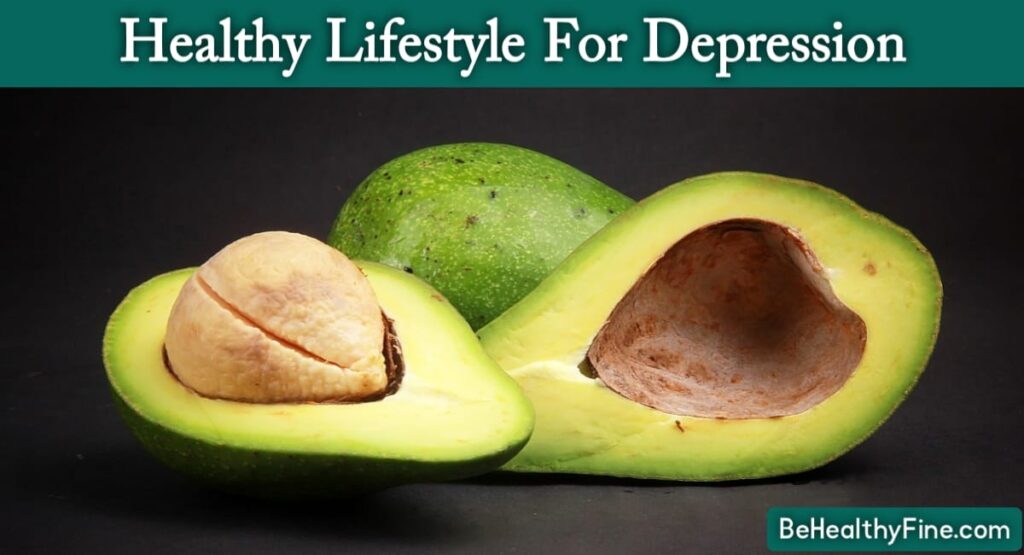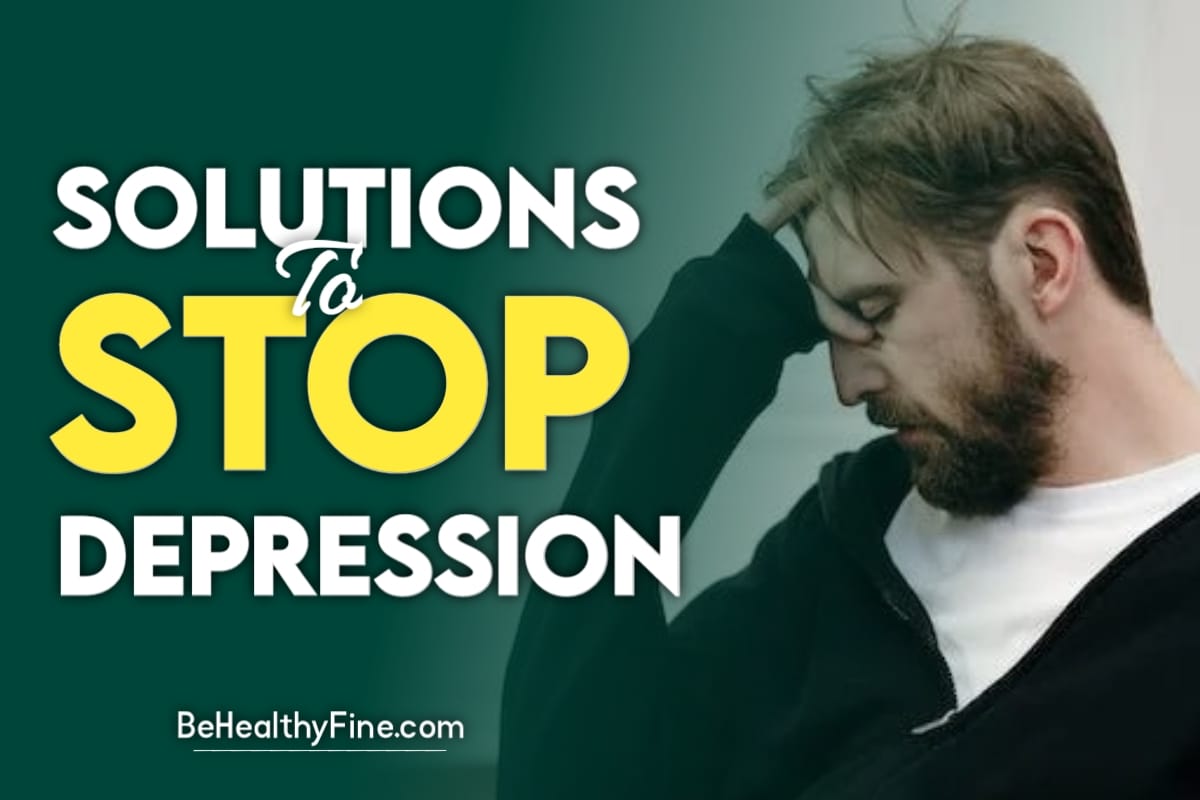Depression affects millions of people around the world, impacting our mental health and overall quality of life. But there is hope. With effective strategies and support, individuals can manage and overcome it. In this article, we will talk about What Helps With Depression and how to promote mental well-being
What is Depression
Depression is more than just feeling sad. It is a complex condition that involves persistent feelings of sadness, hopelessness, and disinterest in activities you once enjoyed.
It may also cause physical symptoms such as fatigue, changes in appetite or sleep patterns, and difficulty concentrating. It is important to understand these aspects of depression in order to recognize this mental health condition and seek help for it.
What Helps With Depression
Several strategies can help manage depression, and we will Talk about 10 Effective Strategies To Improve Your Mental Health. Therapy, Medication, Exercise, Healthy Lifestyle, Social Support, Mindfulness and Meditation, Setting Realistic Goals, Creative Outlets, Seeking Professional Help, Medication Adjustments.
1. Therapy: Helps With Depression
Therapy is important for treating depression. Whether you’re talking to a counselor or trying techniques like CBT, it’s all about understanding why you feel depressed and learning how to cope better.
Therapists teach you strategies to stop the negative thoughts and actions that drag you down. Just talking to someone like that can make you feel less alone and more understood.
Therapy is a great way to deal with depression and get back to happiness. If you’re feeling depressed, Consulting with a therapist can make a big difference in your feelings. [Destroy Your Depression]
2. Medication
Medication may be prescribed to help ease depression. SSRIs or SNRIs are common options that balance the chemicals in your brain to improve your mood. Your doctor will guide you in choosing the right medicine and dosage for you.
It is important to follow their advice closely and keep them informed about how you are feeling. Although medications can be beneficial, open communication with your doctor is important to ensure you get the best treatment for your depression.
3. Exercise

Exercise is a powerful Activity for managing depression. Engaging in regular physical activity triggers the release of endorphins, which are natural mood boosters, in the brain.
Even simple activities like taking a brisk walk or practicing yoga can have significant antidepressant effects. Exercise not only improves physical health but also enhances mental health by reducing symptoms of depression.
Incorporating regular exercise into your daily routine can improve your mood, increase energy levels and promote a sense of overall well-being. So, whether it’s a short walk around the block or a light yoga session, finding ways to stay active can be an effective strategy for combating depression and improving your quality of life.
Related Article: 13 Tips to Mentally Healthy and Happy
Related Article: How to Improve Brain Function and Memory
4. Healthy Lifestyle

Taking care of your body is extremely important for your mental health, especially when you are struggling with depression. Eating healthy foods like fruits, vegetables and whole grains, which is gives your body the nutrients it needs to function well.
Getting enough sleep is also really important. When you’re well rested, you feel better emotionally and can handle stress more easily. It is also important to avoid alcohol and drugs as they can make depression worse.
Instead, try to find healthy ways to deal with your emotions, like talking to a friend or going for a walk. When you’re struggling with depression, taking care of your body by eating well, getting enough sleep, and staying away from harmful things can really help you feel better. [Destroy Your Depression]
5. Social Support
It’s important to rely on the people around you when you’re feeling depressed. Friends, family, or support groups can provide comfort during difficult times. Opening up to someone who cares can reduce feelings of loneliness and increase understanding.
It’s OK to share your experiences with them, they are there to offer support and improve your well-being. A strong support network reminds you that you are not alone, which is important during depression. Don’t hesitate to turn to people you trust for extra help when you need it.
6. Mindfulness and Meditation
Mindfulness meditation is a Good strategy for managing stress and improving mental well-being. This means focusing on the present moment without judging yourself, which helps you feel calmer and more centered.
During meditation, you focus on your breathing and observe your thoughts without getting influenced by them. This helps you become more aware of your thoughts and emotions, so you can handle them better. Over time, mindfulness meditation can help you deal with negative emotions and difficult situations.
It’s easy to learn and can be done every day for your mental health. So, if you’re feeling stressed or overwhelmed, try mindfulness meditation. It can really help your emotions. [Destroy Your Depression]
7. Setting Realistic Goals
Setting realistic goals can help you feel more in control and accomplished, especially when you’re struggling with depression. Instead of trying to do everything at once, break large tasks into smaller steps. This makes them easier to handle.
Set goals that you know you can reach, even if they seem small. Celebrate your progress every time you achieve a goal. This could be something simple, like getting out of bed or taking a short walk.
Recognizing your accomplishments, no matter how small, boosts your confidence and motivation. This feeling of accomplishment can help you feel more positive and give you the courage to keep moving forward.
So, take one step at a time and remember to celebrate your successes along the way.
8. Creative Outlets:
Engaging in creative activities can be a great way to express yourself and release emotions, especially when you’re feeling depressed. Whether it’s painting, writing, or playing music, these activities allow you to express yourself in different ways.
Creativity enables you to transform your emotions into something positive and meaningful. Instead of bottling up your emotions, you can turn them into art. Being creative can also provide a sense of purpose and accomplishment.
Whether you’re sketching, writing, or playing an instrument, you’re doing something that’s uniquely yours. So, if you’re feeling overwhelmed with emotions, try being creative. You may be surprised at how much this can boost your spirits. [Destroy Your Depression]
9. Seeking Professional Help
If you are struggling with depression and are not seeing improvement, it is important to seek help from a professional. A mental health professional, such as a psychiatrist or psychologist, can provide the support and guidance you need.
They will listen to your experiences and create a personalized treatment plan for you. This may include therapy, medication, or a combination. The key is to find what works best for you, and they will collaborate with you to achieve this.
It’s okay to ask for help, and there’s no shame in reaching out to a professional. They are trained to help people like you feel better, so don’t hesitate to reach out if you need help.
10. Medication Adjustments
Adjusting medication for depression may require some trial and error. Your doctor will collaborate with you to determine the most appropriate medication and dosage.
This process may involve trying different medications or adjusting the dosage until you find what works best for you. It is important to talk openly with your doctor about your feelings and any side effects.
This allows them to make the necessary adjustments to your treatment plan for best results. Don’t hesitate to ask questions or share concerns your doctor is there to help you find the medication and dosage that will best support your mental health. [Destroy Your Depression]
Conclusion
Depression is a challenging condition, but it is not impossible to overcome. With the right strategies and support, individuals can manage their symptoms, regain a sense of control, and live fulfilling lives.
Whether through therapy, medication, lifestyle changes or a combination of approaches, there is hope for a brighter future. Remember, you are not alone and help is available. Take the first step toward healing and reach out for help today
How Long Does Depression Last?
The duration of depression is different for each person. Some may experience short episodes lasting a few weeks or months, while others may struggle with long-term depression for years.
Factors such as treatment, support, and coping mechanisms can influence the duration of depression. If symptoms persist or worsen it is essential to seek professional help to effectively manage and overcome depression.
How Do I Know If I Have Depression?
Depression can be challenging to recognize, but common signs include persistent feelings of sadness, hopelessness, or emptiness, loss of interest in activities you once enjoyed, changes in appetite or sleep patterns, fatigue, difficulty concentrating, and feeling self-conscious.
Includes thoughts of self-harm or suicide. If you are experiencing these symptoms for a long time and they interfere with daily life, it is essential to seek help from a health care professional for an accurate diagnosis and appropriate treatment.
How To Get Rid Of Depression?
Seek professional help from a therapist or doctor to overcome depression. They will recommend treatments such as therapy, medication, or a combination.
Additionally, prioritize self-care by exercising regularly, eating healthy, getting enough sleep, and seeking support from friends and family. Remember, recovery takes time, but with the right support and strategies, you can overcome depression.
Which Thing is Best For Depression?
The best approach for depression is different for each person. However, a combination of therapy and medication is often effective.
Additionally, maintaining a healthy lifestyle with regular exercise, balanced nutrition, and adequate sleep can help with mental well-being. Asking for support from Your loved ones and engaging in activities that you enjoy can help to reduce symptoms of depression.
What Is The Most Common Mental illness?
Anxiety disorders, including generalized anxiety disorder (GAD), social anxiety disorder, panic disorder, and specific phobias, are the most prevalent mental illnesses. These conditions affect millions of people globally, causing extreme anxiety, fear, and avoidance behavior that disrupts daily functioning.
Despite their prevalence, effective treatments such as therapy and medication can help individuals manage symptoms and improve their quality of life.







